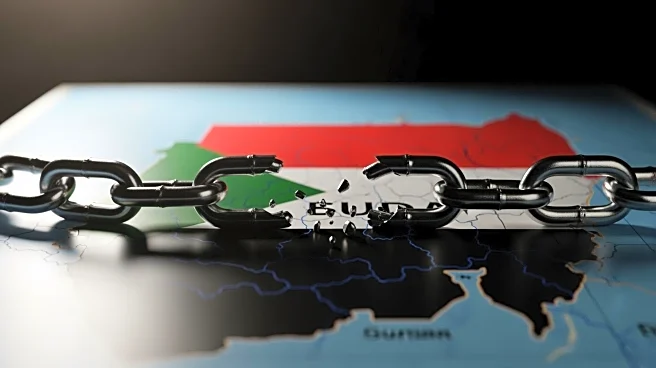What's Happening?
The Rapid Support Forces (RSF) in Sudan have captured the army headquarters in El Fasher, the last stronghold of the Sudanese army in the Darfur region. This development raises concerns about a potential split in Sudan, as the RSF consolidates its control
over Darfur. The RSF has besieged El Fasher for 18 months, targeting civilians with drone and artillery strikes, leading to starvation among the population. The capture of El Fasher is a significant victory for the RSF, which has established a parallel government in Darfur. The conflict, which began in April 2023, has displaced millions and created a dire humanitarian situation.
Why It's Important?
The RSF's capture of El Fasher could lead to significant geopolitical changes in Sudan, potentially resulting in the country's division. The humanitarian crisis in Darfur is severe, with thousands of civilians trapped and facing starvation. The international community is closely monitoring the situation, as the RSF's actions could lead to further ethnic violence and destabilization in the region. The involvement of international players, such as Saudi Arabia, Egypt, and the UAE, complicates the conflict, making it a focal point for regional power dynamics.
What's Next?
The RSF's control over El Fasher may lead to further consolidation of power in Darfur, potentially establishing a parallel government. The international community is likely to increase pressure on Sudan to address the humanitarian crisis and prevent further atrocities. Diplomatic efforts may be intensified to broker a ceasefire and prevent the country from splitting. Humanitarian organizations will continue to push for access to affected areas to provide relief to civilians trapped in the conflict.
Beyond the Headlines
The situation in Sudan highlights the complex interplay of ethnic tensions, resource control, and international influence in conflict zones. The RSF's actions have drawn attention to the need for stronger international mechanisms to prevent genocide and protect civilians. The conflict also underscores the challenges of post-colonial state-building in Africa, where historical grievances and power struggles often lead to prolonged violence.















